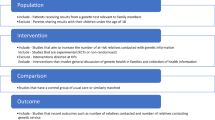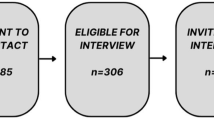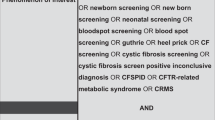Abstract
Standardized approaches to measuring clinical utility will enable more robust evaluations of genetic tests. To characterize how clinical utility has been measured, this scoping review examined outcomes used to operationalize this concept in the context of genetic testing, spanning relevant literature (2015–2017). The search strategy and analysis were guided by the Fryback and Thornbury hierarchical model of efficacy (FT Model). Through searches in Ovid MEDLINE, EMBASE and Web of Science, 194 publications were identified for inclusion. Two coders reviewed titles, abstracts, and full texts to determine eligibility. Results were analyzed using thematic and frequency analyses. This review generated a catalog of outcomes mapped to the efficacy domains of the FT Model. The degree of representation observed in each domain varied by the clinical purpose and clinical indication of genetic testing. Diagnostic accuracy (68%), technical (28.4%), and patient outcome (28.4%) efficacy studies were represented at the highest rate. Findings suggest that the FT Model is suitable for the genetics context however domain refinements may be warranted. More diverse clinical settings, robust study designs, and novel strategies for measuring clinical utility are needed.
This is a preview of subscription content, access via your institution
Access options
Subscribe to this journal
Receive 12 print issues and online access
$259.00 per year
only $21.58 per issue
Buy this article
- Purchase on SpringerLink
- Instant access to the full article PDF.
USD 39.95
Prices may be subject to local taxes which are calculated during checkout


Similar content being viewed by others
References
Van ElCG, Cornel MC, Borry P, Hastings RJ, Fellmann F, Hodgson SV. et al. Whole-genome sequencing in health care. Eur J Hum Genet. 2013;21:580–4. https://doi.org/10.1038/ejhg.2013.46
Xue Y, Ankala A, Wilcox WR, Hegde MR. Solving the molecular diagnostic testing conundrum for Mendelian disorders in the era of next-generation sequencing: Single-gene, gene panel, or exome/genome sequencing. Genet Med. 2015;17:444–51.
Caulfield T, Evans J, McGuire A, McCabe C, Bubela T, Cook-Deegan R, et al. Reflections on the cost of “low-cost” whole genome sequencing: framing the health policy debate. PLoS Biol. 2013;11:7–12.
Nelson B. Ensuring quality in genomic medicine: amid the rise in complex laboratory-developed tests, regulatory officials are seeking the right balance on quality assurance. Cancer Cytopathol. 2014;122:855–6. http://doi.wiley.com/10.1002/cncy.21499
Sun F, Bruening W, Erinoff E, Schoelles KM. Addressing challenges in genetic test evaluation. addressing challenges genet test. Eval Eval Fram Assess Anal Validity. 2011. http://www.ncbi.nlm.nih.gov/pubmed/21834175
Grosse SD, Khoury MJ. What is the clinical utility of genetic testing? Genet Med. 2006;8:448–50. http://www.nature.com/doifinder/10.1097/01.gim.0000227935.26763.c6
Burke W. Genetic tests: clinical validity and clinical utility. Curr Protoc Hum Genet. 2014;81:9.15.1–8. http://www.ncbi.nlm.nih.gov/pubmed/24763995
National Academies of Sciences Engineering and Medicine. An evidence framework for genetic testing. National Academies of Sciences Engineering and Medicine; 2017.
Watson M. Clinical utility of genetic and genomic services: a position statement of the American College of Medical Genetics and Genomics. Genet Med. 2015;17:505–7.
Bossuyt PMM, Reitsma JB, Linnet K, Moons KGM. Beyond diagnostic accuracy: the clinical utility of diagnostic tests. Clin Chem. 2012;58:1636–43.
Garrison LP, Neumann PJ, Willke RJ, Basu A, Danzon PM, Doshi JA. et al. A health economics approach to US value assessment frameworks—summary and recommendations of the ISPOR Special Task Force Report [7]. Value Heal. 2018;21:161–5. https://doi.org/10.1016/j.jval.2017.12.009
Pitini E, Vito C De, Marzuillo C, Andrea ED, Rosso A, Federici A, et al. How is genetic testing evaluated? A systematic review of the literature. Eur J Hum Genet. 2017;605–15. https://doi.org/10.1038/s41431-018-0095-5
Teutsch SM, Bradley LA, Palomaki GE, Haddow JE, Piper M, Calonge N, et al. The evaluation of genomic applications in practice and prevention (EGAPP) initiative: methods of the EGAPP working group. Hum Genome Epidemiol Build Evid Using Genet Inf Improv Heal Prev Dis Second Ed. 2010;11:3–14.
Agency for Healthcare Research and Quality. Methods Guide for Medical Test reviews. Agency for Healthcare Research and Quality; 2012.
Ferrante Di Ruffano L, Hyde CJ, McCaffery KJ, Bossuyt PMM, Deeks JJ. Assessing the value of diagnostic tests: a framework for designing and evaluating trials. BMJ. 2012;344:1–9.
Fryback DG, Thornbury JR. The efficacy of diagnostic imaging. Med Decis Mak. 1991;11:88–94.
Arksey H, O’Malley L. Scoping studies: towards a methodological framework. Int J Soc Res Methodol Theory Pr. 2005;8:19–32.
WHO. Statistical classification of diseases and related health problems 10th revision. World Health Organization; 2016. http://www.who.int/classifications/icd/en/
Botkin JR, Teutsch SM, Kaye CI, Hayes M, Haddow JE, Bradley LA, et al. Outcomes of interest in evidence-based evaluations of genetic tests. Genet Med. 2010;12:228–35. http://www.nature.com/doifinder/10.1097/GIM.0b013e3181cdde04
European Commission. Regulatory framework: the new Regulations on medical devices. European Commision; 2018. http://ec.europa.eu/growth/sectors/medical-devices/regulatory-framework/
Ontario Health Technology Advisory Committee (OHTAC). Decision determinants guidance document: the Ontario Health technology advisory committee (OHTAC) decision-making process for the development of evidence-based recommendations. Ontario Health Technology Advisory Committee; 2010. http://www.health.gov.on.ca/english/providers/program/mas/pub/guide_decision.pdf
Hayeems RZ, Luca S, Ungar WJ, Bhatt A, Chad L, Pullenayegum E. et al. The development of the Clinician-reported Genetic testing Utility InDEx (C-GUIDE): a novel strategy for measuring the clinical utility of genetic testing. Genet Med. 2020;22:95–101. https://doi.org/10.1038/s41436-019-0620-0
NIH National Cancer Institute. Cancer genomics research. 2018. https://www.cancer.gov/research/areas/genomics
Mccarthy JJ, Mcleod HL, Ginsburg GS. Genomic medicine: a decade of successes, challenges, and opportunities. Sci Transl Med. 2013;5:189sr4. https://doi.org/10.1126/scitranslmed.3005785
Calonge N, Klein RD, Berg AO, Berg JS, Armstrong K, Botkin J, et al. The EGAPP initiative: lessons learned. Genet Med. 2014;16:217–24.
Acknowledgements
This work was funded by the Canadian Institutes of Health Research Project Grant (PJT-152880).
Author information
Authors and Affiliations
Corresponding author
Ethics declarations
Conflict of interest
The authors declare that they have no conflict of interest.
Additional information
Publisher’s note Springer Nature remains neutral with regard to jurisdictional claims in published maps and institutional affiliations.
Rights and permissions
About this article
Cite this article
Walcott, S.E., Miller, F.A., Dunsmore, K. et al. Measuring clinical utility in the context of genetic testing: a scoping review. Eur J Hum Genet 29, 378–386 (2021). https://doi.org/10.1038/s41431-020-00744-2
Received:
Revised:
Accepted:
Published:
Version of record:
Issue date:
DOI: https://doi.org/10.1038/s41431-020-00744-2
This article is cited by
-
Clinical use of polygenic risk scores: current status, barriers and future directions
Nature Reviews Genetics (2025)
-
Clinical Validity and Utility of Circulating Tumor DNA (ctDNA) Testing in Advanced Non-small Cell Lung Cancer (aNSCLC): A Systematic Literature Review and Meta-analysis
Molecular Diagnosis & Therapy (2024)
-
Applying the Clinician-reported Genetic testing Utility InDEx (C-GUIDE) to genome sequencing: further evidence of validity
European Journal of Human Genetics (2022)
-
2021 at European Journal of Human Genetics: the year in review
European Journal of Human Genetics (2022)
-
Genomic health data generation in the UK: a 360 view
European Journal of Human Genetics (2022)



